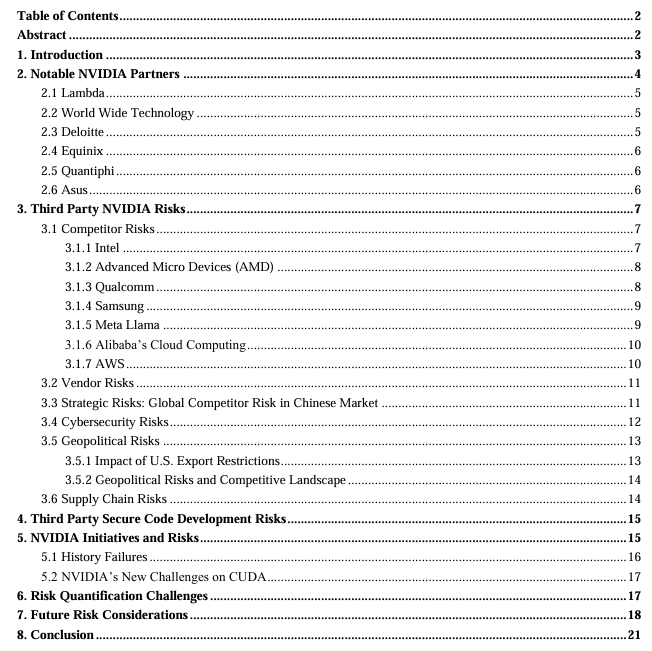The U.S. government’s export restrictions aim to prevent Huawei and SMIC from accessing advanced semiconductor technology. U.S. export restrictions can limit NVIDIA’s ability to sell its advanced GPUs and other technologies to certain countries, especially China, a significant market for many tech companies. This limitation can lead to a substantial immediate revenue loss of NVIDIA’s hardware businesses51, with long-term potential to lose competitive market share in Asia and the creation of comparable competition stemming from Chinese providers. Also, being unable to collaborate or sell to specific international markets can stop NVIDIA’s ability to innovate globally, potentially slowing down technological advancements.
It has to be noted that export restrictions increase geopolitical risks within the global semiconductor supply chain. While the U.S. Department of Commerce intends these measures to curtail China’s technological progress, they may expedite China’s efforts to develop indigenous capabilities. For example, Huawei and SMIC’s collaborative efforts and technological innovations enhance their competitive edge in semiconductor manufacturing52; Huawei and SMIC have managed to circumvent some limitations through innovation and by utilizing older technologies.
Furthermore, Huawei and SMIC are not the only competitors as a result of the U.S export restrictions. The competitors may also include other countries or brands, as they focus on markets under U.S. export restriction laws. According to the Reuters report, Huawei is committing to designing its hardware and software simultaneously to improve AI computing. This strategic move positions Huawei to fill the gap left by NVIDIA, potentially capturing significant market share in both AI hardware and software. As a result, NVIDIA is at risk of losing its foothold in the Chinese AI software market, which could significantly reduce their influence in one of the world’s largest technology markets. This underscores that NVIDIA is experiencing future potentially significant revenue lost impacts from geopolitical risks.
Do not take this lightly. Similar export driven competition existed in electric vehicle markets, and strong example is BYD electric car brand invested in by Warren Buffet, which surpassed the revenue of Tesla, a U.S. based electric car producer, in 2023.
From a geopolitical standpoint, export limitations heighten the competitive risks U.S. companies face. As Chinese firms make technological advances, companies like NVIDIA are confronted with intensifying market competition. In certain performance metrics, Huawei’s A.I. chips are comparable to NVIDIA’s A100, which illustrates China’s accelerated and substantial advancement in high-end semiconductor technology. Huawei is included on the U.S. government’s non-GRATA list, which serves to illustrate China’s capacity to pursue its objectives without concern for global alignment.
U.S. export restrictions could potentially lead to a significant decline in market share for American companies. To reduce their reliance on U.S. technology, companies like Huawei and SMIC are developing self-reliant technologies and expanding domestic market demand. This shift is impacting the market leader position of companies like NVIDIA and altering the competitive dynamics in the global semiconductor market, posing a significant threat to NVIDIA’s market dominance reflected in revenue.
As Google’s experience in the Chinese market shows, especially Google’s decision not to store data in China, Chinese firms are increasingly competing with NVIDIA on both the hardware and software levels. NVIDIA is facing a hard choice: comply to store data in China or let China-based companies take over the local market. Intellectual property preservation and infringement are the main concerns most likely impacting NVIDIA’s actions and decisions.
The whole article can be found at Columbia University Academic Commons.
Authors: Cai, Ziyi; Krehel, Ondrej; Wang, Aolin; Wu, Mengqi; Zhai, Jingsheng and full link Unmasking Vulnerabilities: Assessing Third-Party Risks in NVIDIA.

